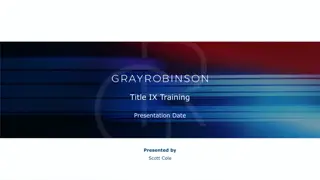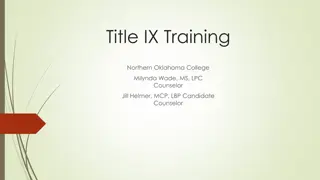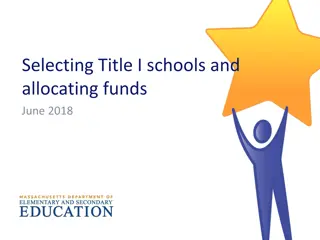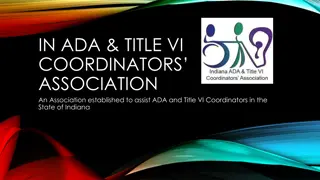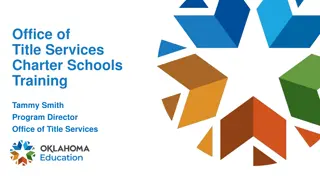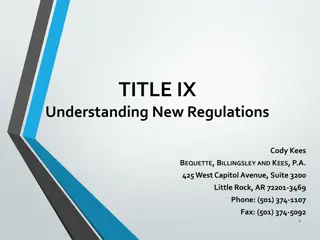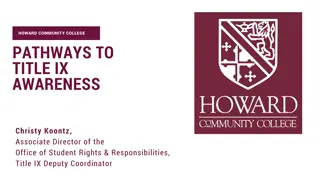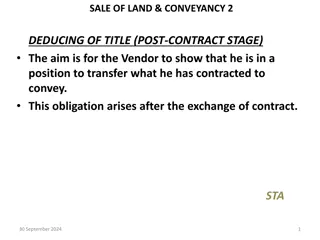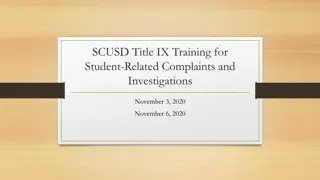
Understanding Title IX in Education: Importance and Impact
Learn about Title IX of the Education Amendments Act of 1972, a federal law prohibiting sex-based discrimination in educational institutions receiving federal funding. Discover who it applies to, its implications beyond athletics, benefits for all genders, enforcement responsibilities, and where to seek information at your institution.
Download Presentation

Please find below an Image/Link to download the presentation.
The content on the website is provided AS IS for your information and personal use only. It may not be sold, licensed, or shared on other websites without obtaining consent from the author. If you encounter any issues during the download, it is possible that the publisher has removed the file from their server.
You are allowed to download the files provided on this website for personal or commercial use, subject to the condition that they are used lawfully. All files are the property of their respective owners.
The content on the website is provided AS IS for your information and personal use only. It may not be sold, licensed, or shared on other websites without obtaining consent from the author.
E N D
Presentation Transcript
Title IX General Training August 2022
Title IX Title IX of the Education Amendments Act of 1972 is a federal law that states: "No person in the United States shall, on the basis of sex, be excluded from participation in, be denied the benefits of, or be subjected to discrimination under any education program or activity receiving Federal financial assistance."
Who does Title IX apply to? Title IX applies to all educational institutions, both public and private, that receive federal funds through federal financial aid programs used by their students.
Does Title IX apply only to athletics? Although it is the application of Title IX to athletics that has gained the greatest public visibility, the law applies to every single aspect of education, including course offerings, counseling and counseling materials, financial assistance, student health and insurance benefits and/or other services, housing, marital and parental status of students, physical education and athletics, education programs and activities, and employment.
Does Title IX benefit only girls and women? Title IX benefits everyone -- girls and boys, women and men. The law requires schools to maintain policies, practices and programs that do not discriminate against anyone on the basis of gender. Elimination of discrimination against women and girls has received more attention because females historically have faced greater gender restrictions and barriers in education. However, Title IX also has benefited men and boys. A continued effort to achieve educational equity has benefited all students by moving toward creation of school environments where all students may learn and achieve the highest standards.
Who is responsible for enforcing Title IX? It is up to BCS to comply with federal law, including Title IX and that the Office for Civil Rights (OCR) of the U.S. Department of Education has the authority to develop policies and regulations to enforce the law. Anyone may file an OCR complaint.
Is there someone at my institution who would know about Title IX? Compliance with Title IX is a shared responsibility of an entire institution, from top-level administration to individual staff members. Title IX mandates that institutions or other recipients of federal funds designate at least one employee as a Title IX coordinator to oversee compliance efforts. Institutions also are required to investigate any complaints of gender discrimination. In addition, all students and employees must be notified of the name, office address and telephone number of the designated Title IX coordinator.
Title IX Coordinator for BCS: Shanon Martin, Title IX Coordinator 828.776.1505/Shanon.Martin@bcsemail.org
What Conduct is Covered Under Title IX Allegations of sexual harassment that occur in an education program or activity located within the United States and of which the recipient has actual knowledge. If a person alleges misconduct that fits in the above description, institutions have a duty to respond. The Title IX Final Rule sets out your legal obligations in responding to such allegations. Online Conduct: Education program or activity encompasses all of a recipient s operations, which may include internet networks, digital platforms, and computer equipment owned or controlled by the recipient. Sexually harassing conduct is not contingent on the method by which the conduct is perpetrated.
What is sexual harassment? Quid pro quo harassment conditioning the provision of an aid, benefit, or service of the school on a person s participation in unwelcome sexual conduct Unwelcome conduct that a reasonable person would find so severe, pervasive, and objectively offensive that it effectively denies a person equal access to the school s education program or activity, including conduct based on sex stereotyping Sexual assault, as defined in federal law, or dating violence, domestic violence, or stalking as defined in federal law
What groups are covered under Title IX? Student-on-Student Employee-on-Student Employee-on-Employee Applicants for admission and employment Student organizations Third parties participating in an education program or activity
All employees must report incidents or reports of sexual harassment Who should the report be made to? Shanon Martin, Title IX Coordinator 828.776.1505/Shanon.Martin@bcsemail.org All employees should be familiar with how to direct students/parents or other employees on how to make a report. For instance, if a student informs a teacher that they have been sexually harassed, the teacher should not only report it to administration but also inform the student that the student can report it as well and who to report it to.
All employees must report incidents or reports of sexual harassment When should they report? Immediately upon receiving a report of sexual harassment.

